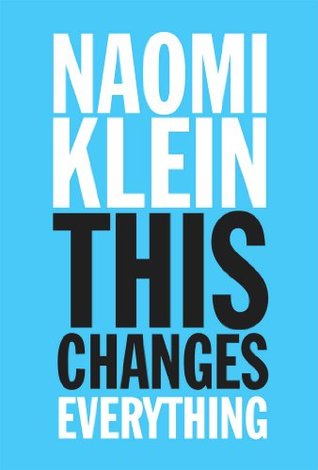More on this book
Community
Kindle Notes & Highlights
Climate change has never received the crisis treatment from our leaders, despite the fact that it carries the risk of destroying lives on a vastly greater scale than collapsed banks or collapsed buildings.
But we need not be spectators in all this: politicians aren’t the only ones with the power to declare a crisis. Mass movements of regular people can declare one too.
The resources required to rapidly move away from fossil fuels and prepare for the coming heavy weather could pull huge swaths of humanity out of poverty, providing services now sorely lacking, from clean water to electricity. This is a vision of the future that goes beyond just surviving or enduring climate change, beyond “mitigating” and “adapting” to it in the grim language of the United Nations. It is a vision in which we collectively use the crisis to leap somewhere that seems, frankly, better than where we are right now.
The past two decades have seen an explosion of ingenious zero-waste design, as well as green urban planning. Not only do we have the technical tools to get off fossil fuels, we also have no end of small pockets where these low carbon lifestyles have been tested with tremendous success. And yet the kind of large-scale transition that would give us a collective chance of averting catastrophe eludes us.
we have not done the things that are necessary to lower emissions because those things fundamentally conflict with deregulated capitalism, the reigning ideology for the entire period we have been struggling to find a way out of this crisis. We are stuck because the actions that would give us the best chance of averting catastrophe—and would benefit the vast majority—are extremely threatening to an elite minority that has a stranglehold over our economy, our political process, and most of our major media outlets.
our economic system and our planetary system are now at war. Or, more accurately, our economy is at war with many forms of life on earth, including human life. What the climate needs to avoid collapse is a contraction in humanity’s use of resources; what our economic model demands to avoid collapse is unfettered expansion. Only one of these sets of rules can be changed, and it’s not the laws of nature.
As Robert Manne, a professor of politics at La Trobe University in Melbourne, puts it, climate science is for many conservatives “an affront to their deepest and most cherished basic faith: the capacity and indeed the right of ‘mankind’ to subdue the Earth and all its fruits and to establish a ‘mastery’ over Nature.” For these conservatives, he notes, “such a thought is not merely mistaken. It is intolerable and deeply offensive. Those preaching this doctrine have to be resisted and indeed denounced.”25
the World Bank warned in a 2012 report that for poor countries, the increased cost of storms, droughts, and flooding is already so high that it “threatens to roll back decades of sustainable development.”)
Drought and famine will continue to be used as pretexts to push genetically modified seeds, driving farmers further into debt.42
And rather than recognizing that we owe a debt to migrants forced to flee their lands as a result of our actions (and inactions), our governments will build ever more high-tech fortresses and adopt even more draconian anti-immigration laws. And, in the name of “national security,” we will intervene in foreign conflicts over water, oil, and arable land, or start those conflicts ourselves. In short our culture will do what it is already doing, only with more brutality and barbarism, because that is what our system is built to do.
“if you hate government intrusion into people’s lives, you’d better stop catastrophic global warming, because nothing drives a country more towards activist government than scarcity and deprivation. . . . Only Big Government—which conservatives say they don’t want—can relocate millions of citizens, build massive levees, ration crucial resources like water and arable land, mandate harsh and rapid reductions in certain kinds of energy—all of which will be inevitable if we don’t act now.”55
for more than two decades, we kicked the can down the road. During that time, we also expanded the road from a two-lane carbon-spewing highway to a six-lane superhighway. That feat was accomplished in large part thanks to the radical and aggressive vision that called for the creation of a single global economy based on the rules of free market fundamentalism, the very rules incubated in the right-wing think tanks now at the forefront of climate change denial. There is a certain irony at work: it is the success of their own revolution that makes revolutionary levels of transformation to the
...more
“To the extent people prioritize values and goals such as achievement, money, power, status and image, they tend to hold more negative attitudes towards the environment, are less likely to engage in positive environmental behaviors, and are more likely to use natural resources unsustainably,”
Defenders of these trade deals argue that protections like Ontario’s buy-local provisions distort the free market and should be eliminated. Some green energy entrepreneurs (usually those that purchase their products from China) have made similar arguments, insisting that it doesn’t matter where solar panel and wind turbines are produced: the goal should be to get the cheapest products to the consumer so that the green transition can happen as quickly as possible.


